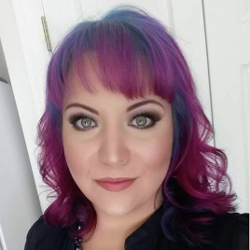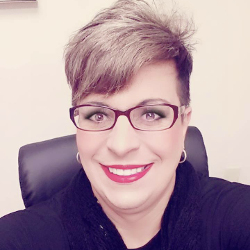 Kristen Canon Mason is the owner of the Balance & Beauty Collective, a salon dedicated to diversity in the Flint area.
Kristen Canon Mason is the owner of the Balance & Beauty Collective, a salon dedicated to diversity in the Flint area.In a tumultuous time that is quickly being dubbed the "Trump era," safe spaces — controversial to the right, but pivotal to the left — are being discussed nonstop. Mia Catherine Smith, a transgender stylist based out of North Carolina with 22 years of "behind the chair" experience, had been percolating an idea for safe salon spaces though before even this election: Safe in my Chair. The project, which has quickly found national and international success, aims to train stylists and barbers so that they're equipped to help trans clients that find their way to their chair by accessing SafeInMyChair.com.
"Safe in my Chair has a two fold purpose," says Smith. "It's basically a resource for transgender people to find a safe environment: a safe salon and a safe stylist or barber, so they can feel good about themselves. A lot of times when you walk into a salon being transgender, you're aware that not everyone is going to be accepting — that not everyone 'gets it.' I have vetted these people on the list and made sure they understood my message."
Smith's goal comes from a multifaceted history: she was outed in a salon as a teenager, but has also found her truest self in the salon.
 Mia Catherine Smith is the founder of Safe in my Chair
Mia Catherine Smith is the founder of Safe in my Chair"Being both transgender and a stylist, it's been a passion most of my life — and for most of my life, the place where Mia truly exists is in the salon. I've had both really bad and really good experiences … I was outed publicly in a salon in a very small town. I was the quarterback of the high school football team and I was a senior, and we were undefeated — and I was the shit," she says sardonically.
"I sat down to get my hair cut in this small town salon, and the stylist said, 'You have amazing eyes. Women would kill to have these eyes; with just a little mascara…' And I paused and I just went with it and I said, 'Well, it's funny you mention that, because I feel like a woman inside.' And she said, 'What, like one of those fag crossdressers?' as loud as she could, at noon, on a Saturday, in a packed salon. And I was mortified."
"The 'Mark' in me wanted to slap the shit out of her," Smith confesses, "but the Mia in me wanted to crawl inside of a cave. I spent over an hour crying in my car in the parking lot; the quarterback of the team crying in the car — over a haircut."
"I had one (experience) where I went in and asked for a feminine hairstyle. She (the stylist) asked why, and I said, 'Because I'm transgender and I've always known I was.' She said very publicly, 'Oh I don't do that shit, sweetheart. That's just sick, you fetish freak.'
"If I can prevent somebody else from being put in that situation, I will do whatever I possibly can. And when people hate, it's not that they're hating the person — they're hating their lot in life, or their lack of education or their standing. It's very rarely directed at the person who ends up taking the brunt of it. I just want people to understand that love wins — you can't fight hate with hate. Fighting hate with hate is like trying to put a coat on in the middle of summer to cool off. It doesn't work."
Forging connections between hair stylists and trans clients is crucial, especially in light of how critical hair growth or length often is for those transitioning.
"A lot of transgender people cut their own hair, and a lot of that comes from a fear of the salon," notes Smith. "Besides your spouse and your doctor, getting your hair cut is another very intimate experience — it's a very 'in your space' experience. And many transgender people suffer from PTSD. A lot of women have been traumatized — some of them have been attacked, raped, and mentally, physically and verbally abused, so it's difficult for them to trust people they don't know. What Safe in my Chair does is give them a resource to know that this person is safe, this person is going to care for them and accept them without judgment and open their chair and their heart."
That intimacy, both physically and emotionally, is affecting, with Smith noting emotionally, " … It's a very powerful thing when that trans client is turned around in the chair for the first time; sometimes you get to be the very first person in the world to see them as authentically real. It's a moment that only happens once, when they see their true authentic selves, and you get to share in that. Sometimes that stylist is the only other person in the world who knows that trans client's secret. The bond between them is unbreakable, and every trans client should have that ally — and this site gives them that ally, gives them someone that says, 'My chair is warm and and welcoming, come in — I understand and I will help you.'"
This project also does much more than benefit trans women and men seeking a safe space to groom their authentic selves; stylists who get listed get to "connect with a new client base, as well as broaden their skill set" says Smith.
Part of the process of getting vetted for the Safe in my Chair salon list is to first partake in Smith's training, where she works on the mental and emotional skills necessary for dealing with trans clients.
"Safe in my Chair training is basically a four hour skillset training. A stylist goes to school and gains technical knowledge and technical skills — years with scissors in hand, clippers in hand — but basically what I do is give them skills you don't learn in school. I work on their tactfulness, their compassion. I give the stylist tools that will allow them to listen and to understand. I specifically teach listening skills to understand, not to respond. Too many people listen these days and they're already thinking of a response and thinking of a retort (instead of listening).
"I teach them what to say, what not to say, when to say it. How to treat a transgender client differently. A lot of these clients have been through trauma. Transgender clients are high maintenance, there's no doubt about that. They might have a breakdown in the chair where dysphoria takes over, and I teach the stylist how to diffuse that situation, or just what dysphoria is and what triggers are, and how to sidestep that mine field.
"More than anything, it's teaching the stylist how to address trans clients and what's acceptable/not acceptable. Teaching them terminology, teaching them what today's LGBT community is. There are people who are asexual, pansexual, gender fluid. There are a lot more young folks who are now gender fluid today. Teenagers are very susceptible to emotional issues; a lot of them are going through turmoil anyway, so if you put gender issues on top of that, you're going to have a really big problem. I want to have a stylist who can make them more comfortable."
Comfort of both the trans client and the cis stylist is key to creating the bond Smith hopes to see worldwide. "A lot of us have sat in a chair where the stylist stands behind us and doesn't seem confident, and we don't want our hair cut by someone who's not confident. I'm going to give stylists the confidence so the client feels so overwhelmingly welcome in the chair that they let their guard down, so they can be their truth, authentic selves. Genuine."
Making Michigan Salons Safer
After astronomical success vetting and expanding the list — "I have not slept in a week," Smith admits — she brought on 10 other stylists to help the project. "These 10 have all been chosen because of the impeccable nature of their character — these ladies really know what it means to be kind and accepting and caring. I would never in a million years surround myself with anyone who wasn't; these girls represent me."
One of those stylists, Kristen Cannon Mason of the Balance & Beauty Collective in the Flint area, says she feels this movement will find huge support in the state. "Specifically in my area, people tend to think of Flint as such a terrible place to live, but we have such diversity and so many have the heart to stick up for those that need it. I've had a hand in educating a big chunk of professionals in the last 10 years, as well as networking for the last 15, and I know that we have a huge number of open, compassionate people in our area. Our salon specifically made it our mission to be a comfortable place for everyone when we opened, and my team is 100 percent behind this."
"I have followed Kristen for a long time," says Smith of adding Mason to the project. "I befriended her as 'Mark.' I'm drawn to people who show amazing character with others, and Kristen has shown her ability to communicate with others and express herself and listen to other people's concerns genuinely."
Mason notes that, as a stylist with 14 years experience including 10 years as an instructor and four as a massage therapist, she was drawn to Smith's approach to education. "One of the reasons I could really get behind Mia and the way she wanted to do things was that she's not about pointing a finger, or saying there's division, or saying stylists who perhaps don't understand transgender clients are bad," she says. "She realizes most of it is due to ignorance or being oblivious. With teaching the last several years, it's something I bring up in class in cosmetology and especially in aesthetics, because frankly we deal much more with the body and it's a more personal space. I make sure I have conversations with the students.
"I will say nine times out of 10, if they are not prepared to deal with various clients, it's really not about them not being compassionate or being hateful — it's literally just ignorance. I really like Mia's approach to making everybody feel accepted and promoting education and comfort levels. I love the way she's heading towards things, and I'm just so excited to be a part of it."
Smith's approach includes advice to not only the stylists she trains, but to prospective trans clients as well. "My biggest piece of advice is use the list, of course — those stylists have been vetted, have been trained and are certified with my logo. Relax, you're in a safe place, and let your guard down. It's OK. You're the expert, the stylist is there to assist you and coach you, but you're the lead. No one knows more about you than you do. Tell the stylist how you feel, talk about your emotions, develop that bond that can't be broken. Allow them to trust you."
Smith tearfully admits, "There are times where it's not going to go well — I wish I could guarantee that for people, but I can't. I can only promise each one of those people that I'll never stop fighting for them, or educating others. Education is key. And the transgender client has the responsibility to educate, and sometimes they're going to get bit and they're going to get uncomfortable. The fact is they have to help the stylist by telling them everything they possibly can — like talking about their dysphoria triggers — to help the stylist make a decision."
What's Next?
Smith's set her scope to the future, even in her own controversial state. "Being in North Carolina is uniquely different, which (former governor) Pat McCrory has seen to, no doubt. Roy Cooper has changed that a bit in being elected. It's funny, most of the transgender people just use the bathroom they want to use. It's not an issue — the law is unenforcible. But it actually rallies people — his law backfired in a very, very big way."
This sort of hopeful look on anti-trans backlash carried over to Safe in my Chair, where every state in the U.S. has a member now on the list. "I got responses back proportionate to the population levels in the states, which makes me feel very good that there's no regional biases. We have members in six different countries, and I have trainings set up in the U.K., Australia and Canada. It's all coming to fruition and it's all I've ever wanted to do: make sure people have a safe space and feel warm and accepted."
With the quick success Safe in my Chair is having, Smith hopes to widen the project beyond just safe spaces for trans people.
"I see Safe in my Chair widening its scope from gender protection to being a truly Safe in my Chair for anything," she shares. "Say that young black woman lives in a small town and there is no predominantly black salon; I want her to be able to call that white salon because she sees them on the list, and they're safe, and she will not be ridiculed or harassed.
"It's a common desire — we go to the salon or the barbershop to feel better about ourselves. It's not a privilege to do these things. It should be a right. It's ridiculous that it's not that way."
For more information on the Safe in my Chair project, visit SafeInMyChair.com. The Balance & Beauty Collective, a salon devoted to diversity, is located at 6197 Miller Road, Suite 2, Swartz Creek; to contact the salon, call 810-412-8308.











